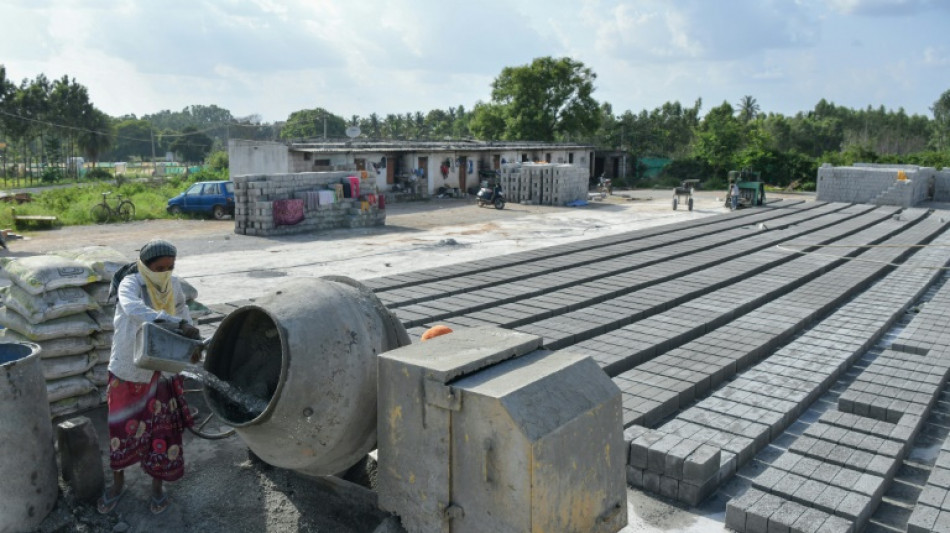
-
 Scotland spoil Italy's T20 World Cup debut with big win
Scotland spoil Italy's T20 World Cup debut with big win
-
Israeli president says 'we will overcome evil' at Bondi Beach

-
 Munsey leads Scotland to 207-4 against Italy at T20 World Cup
Munsey leads Scotland to 207-4 against Italy at T20 World Cup
-
Japan restarts world's biggest nuclear plant again

-
 Bangladesh poll rivals rally on final day of campaign
Bangladesh poll rivals rally on final day of campaign
-
Third impeachment case filed against Philippine VP Duterte

-
 Wallaby winger Nawaqanitawase heads to Japan
Wallaby winger Nawaqanitawase heads to Japan
-
Thailand's Anutin rides wave of nationalism to election victory

-
 Venezuela's Machado says ally kidnapped by armed men after his release
Venezuela's Machado says ally kidnapped by armed men after his release
-
Maye longs for do-over as record Super Bowl bid ends in misery

-
 Seahawks' Walker rushes to Super Bowl MVP honors
Seahawks' Walker rushes to Super Bowl MVP honors
-
Darnold basks in 'special journey' to Super Bowl glory

-
 Japan's Takaichi may struggle to soothe voters and markets
Japan's Takaichi may struggle to soothe voters and markets
-
Seahawks soar to Super Bowl win over Patriots

-
 'Want to go home': Indonesian crew abandoned off Africa demand wages
'Want to go home': Indonesian crew abandoned off Africa demand wages
-
Asian stocks track Wall St rally as Tokyo hits record on Takaichi win

-
 Bad Bunny celebrates Puerto Rico in joyous Super Bowl halftime show
Bad Bunny celebrates Puerto Rico in joyous Super Bowl halftime show
-
Three prominent opposition figures released in Venezuela

-
 Israeli president says 'we shall overcome this evil' at Bondi Beach
Israeli president says 'we shall overcome this evil' at Bondi Beach
-
'Flood' of disinformation ahead of Bangladesh election

-
 Arguments to begin in key US social media addiction trial
Arguments to begin in key US social media addiction trial
-
Dr. Jonathan Spages Expands Diabetes Reversal Practice Across New States, Adds Clinical Team to Meet Growing Demand

-
 Agronomics Limited Announces Net Asset Value Calculation as at 31 December 2025
Agronomics Limited Announces Net Asset Value Calculation as at 31 December 2025
-
UK-Based Vesalic Limited Emerges from Stealth with Landmark Discovery of Potential Non-CNS Driver of Motor Neuron Diseases, including ALS, and Breakthrough Therapeutic and Diagnostic Opportunities

-
 Gotterup tops Matsuyama in playoff to win Phoenix Open
Gotterup tops Matsuyama in playoff to win Phoenix Open
-
New Zealand's Christchurch mosque killer appeals conviction

-
 Leonard's 41 leads Clippers over T-Wolves, Knicks cruise
Leonard's 41 leads Clippers over T-Wolves, Knicks cruise
-
Trump says China's Xi to visit US 'toward the end of the year'

-
 Real Madrid edge Valencia to stay on Barca's tail, Atletico slump
Real Madrid edge Valencia to stay on Barca's tail, Atletico slump
-
Malinin keeps USA golden in Olympic figure skating team event

-
 Lebanon building collapse toll rises to 9: civil defence
Lebanon building collapse toll rises to 9: civil defence
-
Real Madrid keep pressure on Barca with tight win at Valencia

-
 PSG trounce Marseille to move back top of Ligue 1
PSG trounce Marseille to move back top of Ligue 1
-
Hong Kong to sentence media mogul Jimmy Lai in national security trial

-
 Lillard will try to match record with third NBA 3-Point title
Lillard will try to match record with third NBA 3-Point title
-
Vonn breaks leg as crashes out in brutal end to Olympic dream

-
 Malinin enters the fray as Japan lead USA in Olympics team skating
Malinin enters the fray as Japan lead USA in Olympics team skating
-
Thailand's Anutin readies for coalition talks after election win

-
 Fans arrive for Patriots-Seahawks Super Bowl as politics swirl
Fans arrive for Patriots-Seahawks Super Bowl as politics swirl
-
'Send Help' repeats as N.America box office champ

-
 Japan close gap on USA in Winter Olympics team skating event
Japan close gap on USA in Winter Olympics team skating event
-
Liverpool improvement not reflected in results, says Slot

-
 Japan PM Takaichi basks in election triumph
Japan PM Takaichi basks in election triumph
-
Machado's close ally released in Venezuela

-
 Dimarco helps Inter to eight-point lead in Serie A
Dimarco helps Inter to eight-point lead in Serie A
-
Man City 'needed' to beat Liverpool to keep title race alive: Silva

-
 Czech snowboarder Maderova lands shock Olympic parallel giant slalom win
Czech snowboarder Maderova lands shock Olympic parallel giant slalom win
-
Man City fight back to end Anfield hoodoo and reel in Arsenal

-
 Diaz treble helps Bayern crush Hoffenheim and go six clear
Diaz treble helps Bayern crush Hoffenheim and go six clear
-
US astronaut to take her 3-year-old's cuddly rabbit into space


Scientists say they can make zero-emission cement
Researchers on Wednesday said they were a step closer to solving one of the trickiest problems in tackling climate change -- how to keep making cement despite its enormous carbon footprint.
In a world first, engineers from Britain's University of Cambridge have shown that cement can be recycled without the same steep cost to the environment as making it from scratch.
Cement binds concrete together but the whitish powder is highly carbon-intensive to produce, with the sector generating more than triple the emissions of global air travel.
Demand for concrete -- already the most widely used construction material on Earth -- is soaring, but the notoriously polluting industry has struggled to produce it in a less harmful way to the climate.
The team at Cambridge believes it has a solution, pioneering a method that tweaks an existing process for steel manufacturing to produce recycled cement without the associated CO2 pollution.
This discovery, published in the journal Nature, could provoke "an absolutely massive change" by providing low-cost and low-emission cement at scale, said Julian Allwood, who co-authored the research.
"It is an extremely exciting project... I think it's going to have a huge impact," said Allwood, an expert on industrial emissions and key contributor to reports from the UN's scientific panel on climate change.
To produce cement, the basic ingredient in concrete, limestone must be fired in kilns at very high temperatures usually achieved by burning fossil fuels like coal.
On top of that, limestone produces significant additional CO2 when heated.
- 'Bright hope' -
The cement industry alone accounts for nearly eight percent of human-caused CO2 emissions -- more than any country except China and the United States.
Some 14 billion cubic metres of concrete are cast every year, according to industry figures, and more still will be needed as economies and cities grow in future.
The International Energy Agency says that if emissions from the cement industry continue to increase, a pledge of carbon neutrality by 2050 will almost certainly remain out of reach.
Many efforts to produce low-carbon or so-called "green cement" are too expensive or difficult to deploy at scale, rely on unproven technologies, or don't come near zero emissions.
The Cambridge researchers approached the problem by looking at an industry that was already well established -- steel recycling, which uses electric-powered furnaces to produce the alloy.
They substituted a key ingredient in that process with old cement sourced from demolished buildings, Allwood said.
Instead of waste being produced, the end result was recycled cement ready for use in concrete, bypassing the emissions-heavy process of superheating limestone in kilns.
This method -- which has a patent pending -- was "a very low disruption innovation" requiring little change or additional cost on the part of business, Allwood said.
If powered by renewable energy, he said, these furnaces could hope to produce zero-emission concrete at scale.
"Once the electricity has no emissions, then our process would have no emissions," Allwood said.
Countries could not hope to bring CO2 emissions to zero by 2050 -- the key pledge of the Paris climate agreement -- using concrete as it exists today, he added.
"This is the big bright hope, I think," Allwood said.
Y.Aukaiv--AMWN


